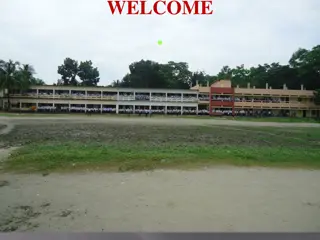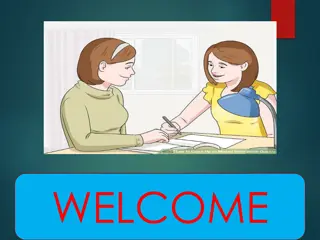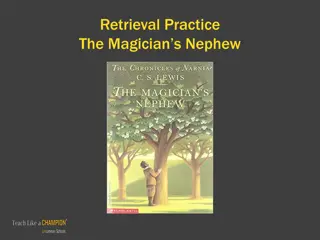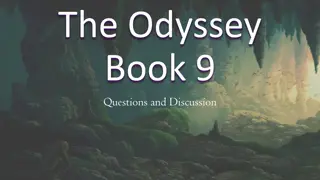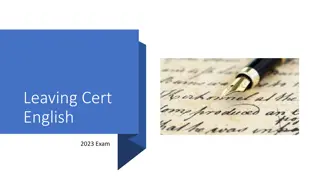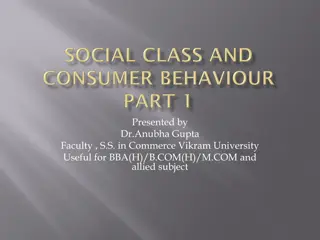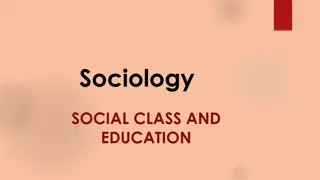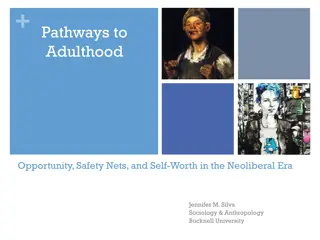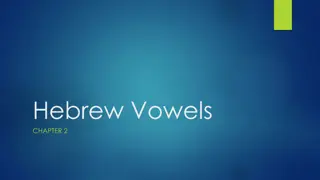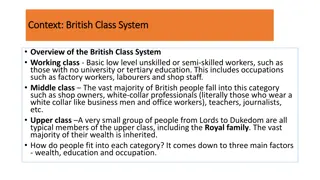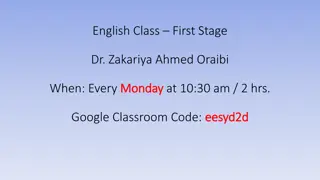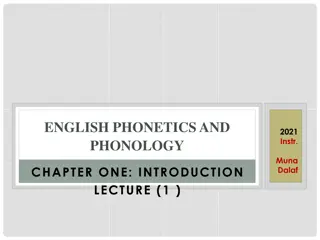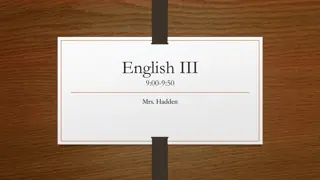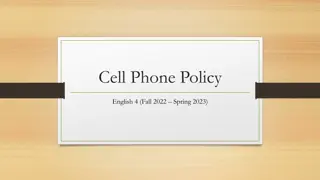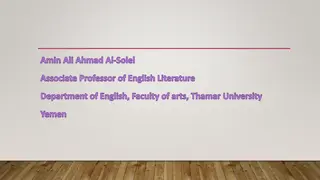Understanding Narration in English Class
In this English class, the topic discussed is Narration, where students learn to define and classify narration and transform direct to indirect speech. Narration is explained as the way of reporting a speaker's speech, distinguishing between direct and indirect narration. Various structures and examples of narration transformation are provided to enhance students' understanding.
Download Presentation

Please find below an Image/Link to download the presentation.
The content on the website is provided AS IS for your information and personal use only. It may not be sold, licensed, or shared on other websites without obtaining consent from the author. Download presentation by click this link. If you encounter any issues during the download, it is possible that the publisher has removed the file from their server.
E N D
Presentation Transcript
WELCOME To English Class
Teachers IdenTITy Md.Maznu Mian Lecturer in English Garadoba Siratunnabi Alim Madrasah Sarishabari , Jamalpur
Class: Eleven/Twelve Today s Topic Narration
Learning outcomes After this lesson Students will be able to Define Narration Classify Narration Change from direct to indirect narration.
What is narration? The way of reporting the speech of a speaker is called narration.
Narration Indirect Narration Direct Narration Direct Narration is the exact speech said by the speaker which is put within quotation marks. Indirect Narration, also known as reported speech, is the substance of the speaker s speech given by someone else.
Look at the following sentence very carefully He said to his friend, I like sweets very much. Object Person Speaker Person Reported Speech Reporting Verb Person, Tense Reporting Verb, Connector
Chart of Transformation Structures of Narration Sentence category Structures of Reporting verb told/replied Connec ting words that Structures of Reported speeches (Subject+ verb+ object+ extra) (Subject+ verb+ object+ extra) Assertive sentence Interrogativ e sentence asked If/ Wh- questio n to not to Imperative sentence ordered/ requested/ advised/ forbade/ told (verb+ extra)
Chart of Transformation Structures of Narration Sentence category Structures of Reporting verb Conn ectin g words Structures of Reported speeches Optative sentence wished/prayed That (Subject+ might+ verb+ etc) (i) Subject + Verb +etc (ii) (Subject+ verb+ very/a very/a great+ adjective+ extra) (i) Subject(We/they)+ should+ verb+ extra (ii) (Subject+ might+ exclaimed with joy/sorrow /wonder. exclaimed/told proposed to Exclamator y sentence Imperative Sentence (Use of Let) That That Told .
Change of Person in Reported speech Reported speech 1st person(I, we, me, us, my, our) 2nd person(you, you, your) Reporting speech Speaker Person Object Person (Listener) 3rd person(he, she, they, it, him, her, them, it, his, her, their, its) No change
Change of Tense in Reported speech Assertive Sentence: Generally, a tense can be changed by making past form of Auxiliary Verb and by the following ways- Direct Narration (i) Subject + Verb (Present form) (Past (ii) Subject + do not/ does not (iii) Subject + Verb (Past form) (iv) Subject + did not + Verb not + (v) Subject + was/were (vi) Sub + must Indirect Narration (i) Subject + Verb (ii) Subject + did not (iii) Subject + had + Verb (Past participle) (iv) Subject + had form) (v) subject + had been (vi) Sub+ had to Verb (Past participle)
Change of Tense & Sentence in Reported speech Interrogative Sentence: (i) A.V. + Subject + Verb (ii) Do/Does + Sub + Verb (iii) Do/Does + sub + not (iv) Did + Subject + Verb (v) Was/were + subject (vi) Must + Subject Direct Narration (ii) Sub+Verb(Past form) (iv) Subject + did not (iv) Subject + had + verb (past participle) (v) Subject + had been (vi) Subject + had to Indirect Narration (i) Subject + Past form of A.V. + Verb
There are some words or Phrases that have to change Direct Speech This Sir Yes Forms in Indirect Speech That Respectfully said/asked . Replied in the affirmative that Replied in the negative that Subject+ thanked+ object No Thanks
There are some words or Phrases that have to change Direct Speech Good morning/ noon/ afternoon/evenin g Good bye/good night/farewell By Allah/God/ Jove/my life.. Ok Hello/hi Forms in Indirect Speech Subject+ wished+ object+ good morning/ noon/ afternoon/ evening Subject+ bade+ object+ good bye Swearing by Allah/God/Jove/my life.. Subject+ agreed that Subject+ greeted that
The forms of interrogative, imperative, exclamatory and optative sentences are changed to assertive sentence. The tense of reported speech is changed according to the tense of reporting speech. First Person in the reported speech changes according to Subject & Second person according to object reporting speech. For third person there is no change. in the
Group Work 1. The woman said, What a beautiful child this is! The woman exclaimed that child was very beautiful. 2. His aunt said, What a pleasant surprise to see you here! His aunt exclaimed that it was a pleasant surprise to see him there. 3. The land lord said to his servant,"Go away and leave the room at once. The land lord ordered his servant to go away and leave the room at once. 4. She said to her maid servant,"Bring me a glass of water. She ordered her maid servant to bring her a glass of water.
5. The officer said to the peon."Let the visitor come in." The officer told the peon that the visitor might be allowed to come in. 6.The father said to his son,"Let us go out for a walk. The father suggested to his son that they should go out for a walk. 7. The old lady said,"May you live long, my son! The old lady prayed that her son might live long. 8. They said," May you live a long and prosperous life! They prayed that you might live a long and prosperous life.
HOME WORK Change the following sentences into Indirect Speech. 1.His wife said to him, Do you know that my servant stole our money ? 2.Boys said, It has been raining since morning. We cannot play today. 3. She said to him, I am leaving now and shall return after two hours. 4. Her friend said to her, Can you spare your book for me for a week? 5. The old man said to the child, Why did you break this window pane? 6. The teacher said , Boys, what are you doing here? Why do you not go to your class rooms?



